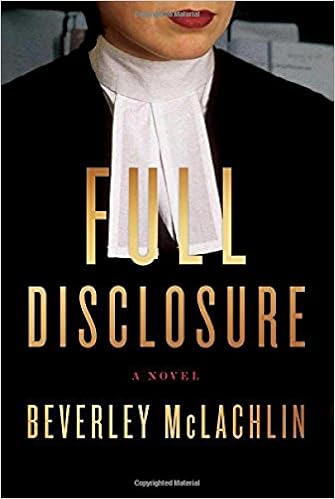 When I heard
that Canada’s first female Chief Justice had written a legal thriller, I had to
check it out. Is there any better-informed
legal authority who could shed light on the Canadian justice system?
When I heard
that Canada’s first female Chief Justice had written a legal thriller, I had to
check it out. Is there any better-informed
legal authority who could shed light on the Canadian justice system?
Jilly
Truitt is an ambitious criminal defense lawyer working in Vancouver. Despite warnings from several people, she
takes on the case of defending a wealthy businessman, Vincent Trussardi, who is
charged with murdering his wife. She
hopes she can find something which will give the jury reasonable doubt to
acquit her client. As she discovers that
Trussardi comes with considerable baggage, she deals with her own past which involved
foster care and drug abuse.
I
appreciated reading a book written from a Canadian perspective. It shows the criminal justice system in
Canada and what happens in a Canadian courtroom; this is a refreshing change
from the plethora of American legal thrillers and television courtroom
dramas. The book is truly Canadian in
many respects: it shows the various
neighbourhoods of Vancouver and makes reference to the Pickton’s pig farm, the vineyards
of the Okanagan, and Indigenous art like Salish carvings. So what’s with the Americanized spelling of
words like “color” and “favor” and “splendor”?
Unfortunately,
there are weaknesses in the novel. For
instance, there are so many people connected to Jilly who have had dealings
with Vincent: her social worker, her
almost-fiancé, her last foster father. What are the chances that a drug dealer known
to Jilly would also have known the murder victim? Months pass for the truth of what happened to
be discovered yet nothing is, but then after the verdict has been delivered,
the truth is quickly revealed.
The
identity of the murderer is fairly obvious.
The list of perpetrators is very short considering how the victim was
killed, so a Sherlock Holmes is not required to solve the case. There
is considerable discussion of “tunnel vision” during the trial, but it seems
that the reader is expected to suffer from this defect.
The book
blurb mentions that Jilly “uncovers a startling revelation that will change not
only the case, but her life forever.”
This is not true. An astute
reader will suspect the truth very early on because the clues are so obvious. Repeatedly conversations are cut short: “’No, I didn’t” and “’It’s over, Jilly’” are
two statements made by people which Jilly should have followed up with “What do
you mean?” but she doesn’t.
I feel uncomfortable
criticizing the work of such an accomplished woman, but I would be less than honest
if I ignored the flaws. The novel is a
quick read with short, easily manageable chapters, and it requires little
thought so the best I can say is that it is a good beach or airport read.
No comments:
Post a Comment